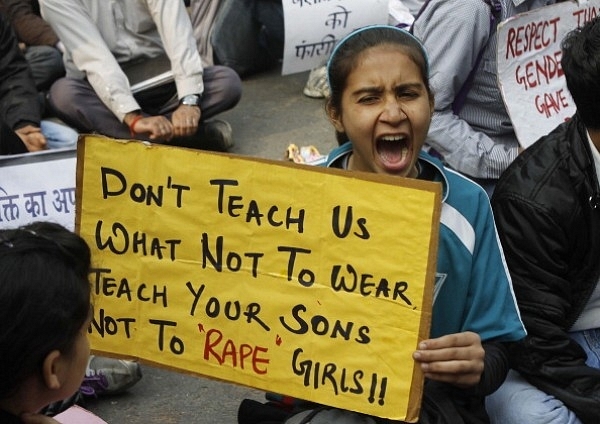Ideas
Yes, No, Maybe... Really!? Why Are We Still Debating “Degree” Of Consent?
- A suggestion in a recent Delhi High Court judgment shows we still have a long way to go to see ‘no’ as a ‘no’ and nothing else, as a society.

No means no and nothing else. (Sunil Saxena/Hindustan Times via Getty Images)
A few weeks ago, a five-year-old Delhi girl returned from school and was hospitalised after her parents found her bleeding. A medical examination confirmed that the girl had been raped and the alleged perpetrator was a school peon.
In August of this year, a 24-year-old man allegedly raped his 20-year-old woman friend, a chef in Delhi, and threw her off a building.
Earlier in May, a three-year-old girl had to undergo surgery in Delhi after a 22-year-old neighbour allegedly raped her.
Even as I write this, the news of a dentist arrested for allegedly raping a 25-year-old woman in his clinic in Delhi’s Kotla Mubarakpur pops up.
Look around and you will find numerous such incidents being reported every day. Yet when it comes to a pass, most forms of redressal – legal or social – invariably end up falling short. This holds true irrespective of the person involved being a common man on the street or the likes of Tarun Tejpal, Mahmood Farooqui or movie mogul Harvey Weinstein; societal mindset fuels their behaviour and then the prospect of practically getting away with just about anything spawns such conduct.
Take, for instance, the recent Delhi High Court judgment in the Farooqui rape case. The judgment suggests that a feeble ‘no’ could very well mean a ‘yes’. Without getting into the merits of this matter, such a sentence can have far-reaching repercussions. This judgment that encapsulates the court’s understanding of ‘no means no’ is an example of how women seeking legal recourse following acts of sexual violence are subjected to a harrowing experience that nearly mirrors the crime.
At the risk of complimenting my husband, Gautam Chintamani, whose book Pink: The Inside Story (HarperCollins, 2017) explores the blatant misogyny in popular Hindi cinema through the prism of the 2016 film Pink, I feel that the time for such films and books has truly arrived.
My earliest recollection of my molestation was when I six or seven years old, when I was touched inappropriately and upon confronting the man, I broke into a physical onslaught. Luckily, my father was close by and seeing me cry, he asked me what had happened, and beat the man to a pulp.
Like many women out there I, too, cannot comprehend what about a mere six-year-old girl aroused the man. Elements that would constitute being feminine were more than lacking at that point in time; I didn’t even have breasts. More than that, I was such a tomboy that subconsciously I felt safer, but this one incident broke that safety circle I had built in my head.
It is not about how you look; it is about the man and his sense of empowerment against your vulnerability. When born a female in a country like India, one’s whole life is a struggle against mindsets that make you believe that you are the weaker sex. Boys being told phrases like “don’t cry like a girl” or “quit fighting like a girl” only make things worse. They create a thought process that view women as being stereotyped primarily to suit the man’s cause. Coupled with such an attitude, a sentence with the words “a feeble no may mean a yes” as part of a court judgment that overturns a rape conviction is only bound to add to the stereotyping of the female gender.
The problem is too deep, too intrinsic and too complex to be resolved with a single solution or a quick fix. In an equally painful realisation, what also hurts is that every time you think a message would go out there and that finally some step would be taken in the right direction – be it the mass reaction following the 2012 Delhi gang rape that led to certain laws being made or changed – there is something that pushes the whole effort a few steps backwards.
A real step forward would be the acceptance, acknowledgment, highlighting and addressing of this issue that has been brushed under the carpet for far too long. The recent sickening incident in Vizag, where a woman was raped in broad daylight and onlookers just walked past or stood and filmed the incident, ought to serve as a wake-up call. One can argue policy change, but till law and order catch up, what about empathy? What about people helping someone in need? Movies like Pink in the year 2016 or a book being written with the same fervour in 2017 followed by a judgment that questions the degree of a ‘no’, shows how far we have to go before society – whether through art, culture or theatre – will address such issues in a more real light.
Introducing ElectionsHQ + 50 Ground Reports Project
The 2024 elections might seem easy to guess, but there are some important questions that shouldn't be missed.
Do freebies still sway voters? Do people prioritise infrastructure when voting? How will Punjab vote?
The answers to these questions provide great insights into where we, as a country, are headed in the years to come.
Swarajya is starting a project with an aim to do 50 solid ground stories and a smart commentary service on WhatsApp, a one-of-a-kind. We'd love your support during this election season.
Click below to contribute.
Latest